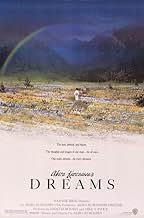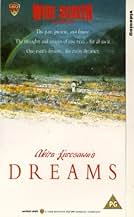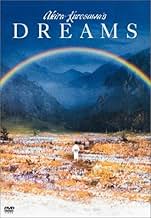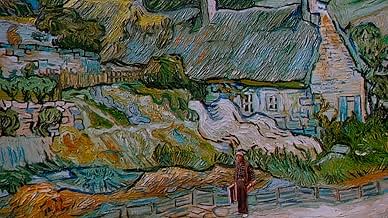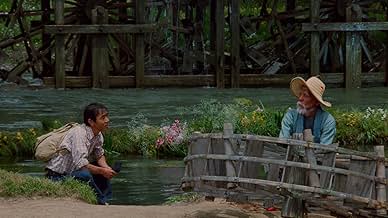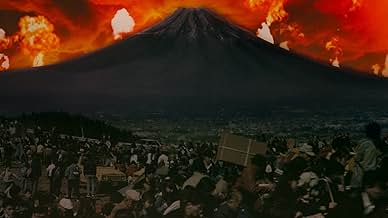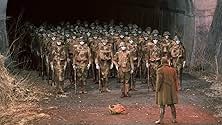CALIFICACIÓN DE IMDb
7.7/10
31 k
TU CALIFICACIÓN
Una colección de historias basadas en los sueños reales del director Akira Kurosawa.Una colección de historias basadas en los sueños reales del director Akira Kurosawa.Una colección de historias basadas en los sueños reales del director Akira Kurosawa.
- Dirección
- Guionistas
- Elenco
- Premios
- 3 premios ganados y 12 nominaciones en total
- Dirección
- Guionistas
- Todo el elenco y el equipo
- Producción, taquilla y más en IMDbPro
Opiniones destacadas
Akira Kurosawa's insights on man's need to harmonize with nature, the costs of war and the bad fruits that nuclear power can bear. This is the first Kurosawa movie I have seen, but I can see how true it is that Kurosawa is a master of creating atmosphere in a film. Such as the dark, post-nuclear apocalyptic world of THE WEEPING DEMON. Or the very first episode when the little boy sees something he is not supposed to see in the forest.
I found THE BLIZZARD rather strange, and you'll see a scary part when the mountainman is having his mirage of the beautiful woman who symbolizes the snowstorm. I'm not sure what the significance of the dog was in THE TUNNEL, but I guess it illustrates the fact that though he was the commander of Third Platoon , he felt like a coward because of his command, his men paid the price.... yet he is guilty of still being alive; he's afraid of the dog.
It ends rather low key, but the last episode THE VILLAGE IN THE WATERMILLS is the most insightful and bold in expressing the movie's theme... of harmonizing with nature, and maybe harmonizing with ourselves.
The procession displays the unity and the communal harmony that the villagers have. And it is the exact opposite of what is grieved about in MOUNT FUJI IN RED or THE WEEPING DEMON. The cinematography is just beautiful. The movie is beautiful and captivating.
Akira Kurosawa's YUME is Grade A- 9/10
I found THE BLIZZARD rather strange, and you'll see a scary part when the mountainman is having his mirage of the beautiful woman who symbolizes the snowstorm. I'm not sure what the significance of the dog was in THE TUNNEL, but I guess it illustrates the fact that though he was the commander of Third Platoon , he felt like a coward because of his command, his men paid the price.... yet he is guilty of still being alive; he's afraid of the dog.
It ends rather low key, but the last episode THE VILLAGE IN THE WATERMILLS is the most insightful and bold in expressing the movie's theme... of harmonizing with nature, and maybe harmonizing with ourselves.
The procession displays the unity and the communal harmony that the villagers have. And it is the exact opposite of what is grieved about in MOUNT FUJI IN RED or THE WEEPING DEMON. The cinematography is just beautiful. The movie is beautiful and captivating.
Akira Kurosawa's YUME is Grade A- 9/10
I was pleasantly surprised with dreams, not only in terms of content but also aesthetically. There are very few films that manage to embody personal, local and global concerns as Akira Kurosava has managed in this production. There are so many underlying topics that it is difficult to concentrate in just a few for the purpose of this review, but I believe it is fair to say that Dreams portrays our individual and collective dreams and nightmares, reflecting that sometimes what we dream of today is what will keep us awake tomorrow. A nice range of representations of concerns from the deepest and most personal childhood worries and fantasies to the more complex issues of mental illness, extreme ambition, destruction of our environment and death. In all I recommend this film to anyone who has the chance to see it, It is possible that Dreams may not appeal to a mainstream audience in terms of content because there is a lot of symbolism and critical engagement but the photography and sceneries are for sure something that should not go amiss for anyone. If you get the chance it is truly worth giving it your time, a fantastic experience.
Most people dream but I wonder how many are rewarded with such beauty when their eyelids close and they drift into semi-consciousness. Kurosawa has collected some of his dreams and shares them with us. I don't ever remember seeing such vivid colours in my own dreams, but like Kurosawa's they are often fragmented and incomplete with a mystical quality involving spirits and the dead.
I like the peach tree scene where true repentance makes things right. Not only the peach blossom but also the kimono of the characters tiered up the hillside are most pleasing to the eye. As also is the meeting with van Gogh when his paintings with mad whirls of colour are brought to life and form part of the landscape.
Some dreams can be very frustrating when we are caught in a dangerous situation from which there is no ready means of escape. This is dramatically illustrated in the Mt. Fuji episode in which nuclear plants explode and a fog of coloured radio-active gases envelopes the characters. There is a strong message here about saving the environment. This message is also accented in the ogre scene and the peach tree scene and the water mill scene.
Some viewers might find the going slow at times. For example, the mountain climbers struggling in knee-deep snow seem to move at the rate of a few steps each minute and being encouraged by their leader to keep going as they strive to reach their camp. A mystical event occurs and in the morning when the heavy fog clears, a surprise awaits them. This feeling of striving and getting nowhere is common in dreams, at least in mine.
There is also mysticism involved in the tunnel scene where an ex-soldier meets the remainder of his platoon all of whom were killed in battle. The sound of their marching feet echoing through the empty tunnel is quite chilling.
Apart from a few dramatic moments the film is somewhat subdued. It is an art film beautifully conceived and should be reserved for one of those quiet moments when we are in a meditative mood.
I like the peach tree scene where true repentance makes things right. Not only the peach blossom but also the kimono of the characters tiered up the hillside are most pleasing to the eye. As also is the meeting with van Gogh when his paintings with mad whirls of colour are brought to life and form part of the landscape.
Some dreams can be very frustrating when we are caught in a dangerous situation from which there is no ready means of escape. This is dramatically illustrated in the Mt. Fuji episode in which nuclear plants explode and a fog of coloured radio-active gases envelopes the characters. There is a strong message here about saving the environment. This message is also accented in the ogre scene and the peach tree scene and the water mill scene.
Some viewers might find the going slow at times. For example, the mountain climbers struggling in knee-deep snow seem to move at the rate of a few steps each minute and being encouraged by their leader to keep going as they strive to reach their camp. A mystical event occurs and in the morning when the heavy fog clears, a surprise awaits them. This feeling of striving and getting nowhere is common in dreams, at least in mine.
There is also mysticism involved in the tunnel scene where an ex-soldier meets the remainder of his platoon all of whom were killed in battle. The sound of their marching feet echoing through the empty tunnel is quite chilling.
Apart from a few dramatic moments the film is somewhat subdued. It is an art film beautifully conceived and should be reserved for one of those quiet moments when we are in a meditative mood.
Dreams is not a movie for everybody. To some, it may be too artsy of a film for their tastes (what are you doing watching movies then?), others may be annoyed by some of the stories not having clear messages, or leaving questions unanswered. Well, that is because Dreams is a film that was born inside of Kurosawa, and lives inside of him, it's a very personal film that not everybody will appreciate.
The movie consists of eight short stories. Most of which center around the issue of people's relationships with other elements that make up this world that we live in.
The cinematography in Dreams is breathtaking, and is the reason why some people claim that it is a film that puts "Style" above "story". I think that nobody can truly completely understand this film but Kurosawa himself. It is a product of his mind, a film that we cannot fully comprehend since we are not him. But since film is a form of art and in its truest form, a reflection of one's own self, Dreams may have just been one of Kurosawa's personal favorites in his long, amazing career.
The movie consists of eight short stories. Most of which center around the issue of people's relationships with other elements that make up this world that we live in.
The cinematography in Dreams is breathtaking, and is the reason why some people claim that it is a film that puts "Style" above "story". I think that nobody can truly completely understand this film but Kurosawa himself. It is a product of his mind, a film that we cannot fully comprehend since we are not him. But since film is a form of art and in its truest form, a reflection of one's own self, Dreams may have just been one of Kurosawa's personal favorites in his long, amazing career.
I am not inclined to post my opinion on web pages. In fact, this is the first time that I feel compelled to let my words be heard on the web. However, having read from other users that "Yume" is "a waste of time" and "too personal" to be enjoyed, I was so disappointed that I felt the right time to speak up had come.
I am the first one to agree that this is not a film for everyone. It is actually far from that. Alas, in this world where the vastest majority of people feel that the necessary and sufficient condition for a film to be good is to have as much special effects as possible, "Yume" sadly faces no other fate than to be overlooked by almost everybody.
It is those few people that might consider watching this film that have the opportunity to appreciate its full greatness. There are still many hurdles on the way, though. For many Western people, including myself, the fact that "Yume" orbits around Japanese legends is a big obstacle to overcome, as we are not well acquainted with their meaning. I am convinced that Kurosawa's "Dreams" conceal much of their true objective to us who are not familiar enough with the Japanese culture.
But my advice is: forget these problems. There are thousands of other details to enjoy. From just a cinematographic point of view, Kurosawa's mastery of colour is unrivaled, and a sound reason to watch this film, yet not the only one by far. The true value of "Yume", in my opinion, is the use of the parabolas presented disguised as dreams to teach us a way of life. The absurdity of war. The beauty of nature. The need to preserve our environment. In summary: a praise to life. And yet, Kurosawa being old himself when he filmed his "Dreams", looks at death and presents it as the last station of a wonderful journey. Carpe diem, yes, but not to the point of being scared. Life will follow its course as does the river at the end of the movie, with or without us being here to enjoy it. Just be thankful for the small things in life; they are the most important. Enjoy them while you can and you will leave this existence in peace with yourself.
"Yume" is one of these small, humble things, so humble that it can be overlooked by many. It would be a waste. Don't let this happen to you. You would miss a true masterpiece. You would miss Kurosawa's way of life.
I am the first one to agree that this is not a film for everyone. It is actually far from that. Alas, in this world where the vastest majority of people feel that the necessary and sufficient condition for a film to be good is to have as much special effects as possible, "Yume" sadly faces no other fate than to be overlooked by almost everybody.
It is those few people that might consider watching this film that have the opportunity to appreciate its full greatness. There are still many hurdles on the way, though. For many Western people, including myself, the fact that "Yume" orbits around Japanese legends is a big obstacle to overcome, as we are not well acquainted with their meaning. I am convinced that Kurosawa's "Dreams" conceal much of their true objective to us who are not familiar enough with the Japanese culture.
But my advice is: forget these problems. There are thousands of other details to enjoy. From just a cinematographic point of view, Kurosawa's mastery of colour is unrivaled, and a sound reason to watch this film, yet not the only one by far. The true value of "Yume", in my opinion, is the use of the parabolas presented disguised as dreams to teach us a way of life. The absurdity of war. The beauty of nature. The need to preserve our environment. In summary: a praise to life. And yet, Kurosawa being old himself when he filmed his "Dreams", looks at death and presents it as the last station of a wonderful journey. Carpe diem, yes, but not to the point of being scared. Life will follow its course as does the river at the end of the movie, with or without us being here to enjoy it. Just be thankful for the small things in life; they are the most important. Enjoy them while you can and you will leave this existence in peace with yourself.
"Yume" is one of these small, humble things, so humble that it can be overlooked by many. It would be a waste. Don't let this happen to you. You would miss a true masterpiece. You would miss Kurosawa's way of life.
¿Sabías que…?
- TriviaAkira Kurosawa had trouble getting financing from studios in Japan, blaming much on the political nature of his criticism of nuclear power in the film. He sent a copy of his script to Steven Spielberg, who liked it, and helped get a deal for the film through Warner Bros.
- ConexionesEdited into Gli ultimi giorni dell'umanità (2022)
- Bandas sonorasIn the Village
(from "Caucasian Sketches, Suite for Orchestra Op. 10, No. 2")
Music by Mikhail Ippolitov-Ivanov (as Ippolitov-Ivanov)
Conducted by Vladimir Fedoseyev (as Vladimir Fedoseev)
Performed by Moscow Radio Symphony Orchestra
Selecciones populares
Inicia sesión para calificar y agrega a la lista de videos para obtener recomendaciones personalizadas
- How long is Dreams?Con tecnología de Alexa
Detalles
Taquilla
- Presupuesto
- USD 12,000,000 (estimado)
- Total en EE. UU. y Canadá
- USD 1,963,207
- Total a nivel mundial
- USD 2,970,161
- Tiempo de ejecución
- 1h 59min(119 min)
- Color
- Mezcla de sonido
- Relación de aspecto
- 1.85 : 1
Contribuir a esta página
Sugiere una edición o agrega el contenido que falta



